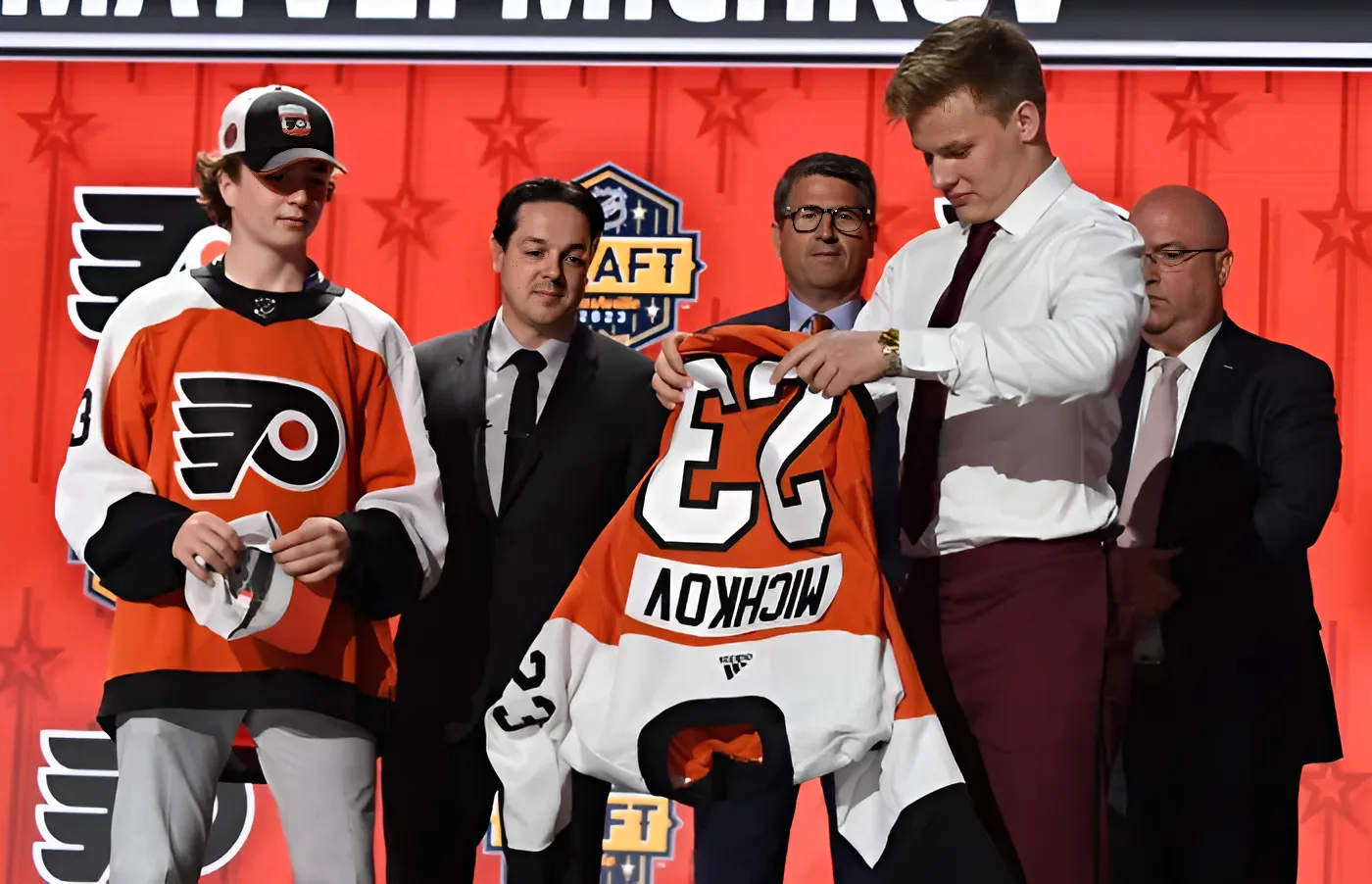This morning, Flyers brass greeted their prized prospect, Matvei Michkov—selected seventh overall at the 2023 NHL Draft in Nashville—at Philadelphia International Airport. In an early indicator of his savviness in playing to the home crowd, Michkov wore a red Phillies hat. Flyers GM Danny Briere wore a toothless grin, every bit the proud parent as he carried a plastic-wrapped bundle of Michkov’s sticks.

For a new but already embattled regime, it was a moment of triumph, a bet paid out early. Defying pre-draft expectation, Michkov signed his entry-level contract July 1st, one year and three days after Philadelphia selected him. Not even a month later, he made his presence not just contractual but physical.
The Flyers nabbed Michkov two spots before Detroit selected Nate Danielson at nine, though the Capitals (who took Ryan Leonard at eight, a selection that has aged brilliantly after Leonard’s freshman season at Boston College) were rumored to covet him with the eighth pick should Philly have passed. Michkov perhaps could have gone as high as second (it’s hard to envision anyone leapfrogging Connor Bedard) if teams knew for a fact at the draft he would sign his ELC the summer after being selected.
Now that the Flyers have their man in town, there are two questions worth considering: (1) What does Michkov’s signing tell us about the draft? and (2) What does it tell us about the state of the Flyers?
To begin with the first question, draft punditry often ascribes a a mercurial character to Russian prospects, suggesting a fundamental (and not entirely imagined) risk that those players will linger on an indefinite timeline in the KHL, rather than coming to North America. The reporting around Michkov’s KHL contract status was incessant long before he was even drafted. The uncertainty driven by the so-called “Russian factor” intensified after the Putin regime’s invasion of Ukraine, creating not just a contractual challenge in bringing over Russian prospects but a geopolitical one.
Something that is genuinely cool about international sports is that because sports are a cultural pastime, different countries do prize distinct characteristics and cultivate unique styles of play, but to use nationality alone as a means of evaluating or understanding a prospect is clearly an errant path. That applies whether it’s a vague suggestion of European players lacking the physicality to play in the NHL (a conclusion any Red Wing fan would surely rebuff immediately) or an ill-informed bit of speculation about the timeline of a prospect’s NHL readiness.
I wouldn’t use Michkov as a precedent for understanding the path of young Russian players to the NHL. Of course, he can serve as a relevant data point in future considerations of the topic, but prospects always seem better understood on a case by case basis than by axioms.
And, of course, the Flyers were also recently on the wrong side of prospect intrigue in the case of Cutter Gauthier, who was traded to Anaheim after expressing his desire to move on from the team that had taken him with the fifth pick in the ’22 Draft, which brings us to our second question.
In and subtle and not-so-subtle terms, Philadelphia brass painted Gauthier as an entitled kid upset he hadn’t been handed NHL playing time who then demanded out. To me, this was an embarrassing response, casting unfair vitriol at a then-19-year-old for his desire for agency. Gauthier used the minimal leverage available to drafted players under the CBA to define his own professional path forward. The Flyers, playing the part of spurned lover, pouted about it publicly.
The fact that the Flyers president Keith Jones was hired to his position with post-playing experience only in broadcasting and thoroughbreds suggested to me an organization worthy of scrutiny, lacking clear direction on the continuum from rebuilding to contending. That Gauthier saw greener pastures elsewhere made complete sense. Does Michkov’s signing change that?
First, Philadelphia absolutely does deserve credit for taking a risk in selecting that has yielded results far quicker than expected. Already, the perceived risk in drafting Michkov appears trivial, though of course now he has the small matter before him of succeeding on the ice in the most difficult league in the world.
Nonetheless, the Flyers also deserve credit for handling the interpersonal side of Michkov’s development process with aplomb. Of course, there is also a fundamental haziness here, as we’ll never really know how much Philadelphia persuaded Michkov to come sooner than he intended with its shrewd management versus Michkov simply following the plan he had in mind all along.
That leaves the question of what’s next for the Flyers on the ice. Michkov should certainly help, but it’s still difficult to see a roster with a seemingly misaligned balance between youth and veterans could wind up with an Eastern Conference playoff spot this year, even as Philadelphia stuck around the race far later than expected a year ago. The good news is that Michkov oozes upside, and perhaps he might just be the offensive spark plug to raise their ceiling. Chances are that’s too much for year one, but give it a bit of time? Who knows, maybe Michkov can make a habit of accelerating past expectations.





